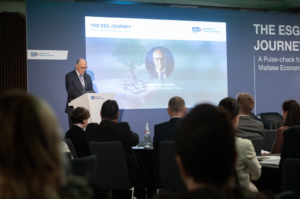 ifs President, Kenneth B. Micallef opened the seminar with a welcome address in which he expressed his gratitude to all the speakers and those attending. Mr Micallef stated that the Institute decided to remain on the theme of ESG, given its growing importance and due to the considerable developments that have taken place recently. Mr Micallef highlighted a number of key areas which are bound to be challenging for the financial services sector and its stakeholders but will also provide opportunities. Mr Micallef ended by stating that the Institute is also playing its part in fostering education and a better understanding of ESG as it will be launching an ESG qualification in collaboration with the University of Malta.
ifs President, Kenneth B. Micallef opened the seminar with a welcome address in which he expressed his gratitude to all the speakers and those attending. Mr Micallef stated that the Institute decided to remain on the theme of ESG, given its growing importance and due to the considerable developments that have taken place recently. Mr Micallef highlighted a number of key areas which are bound to be challenging for the financial services sector and its stakeholders but will also provide opportunities. Mr Micallef ended by stating that the Institute is also playing its part in fostering education and a better understanding of ESG as it will be launching an ESG qualification in collaboration with the University of Malta.
The introductory address was delivered by the Governor of the Central Bank of Malta, Prof. Edward Scicluna who focused on the environment and the fundamental transformations that lie ahead. In line with the strategy of the Eurosystem, the Central Bank of Malta intends to contribute to enhancing the resilience of the economy to climate-related events in an effort to safeguard the public good of stable prices while fostering the transition to a clean environment. The involvement of private actors to finance the transition to net zero by 2050 will be essential.
 In her address, the Hon. Minister for Energy, Enterprise, and Sustainable Development, Dr Miriam Dalli Minister thanked ifs Malta for promoting the agenda of sustainability and for the great timing of the seminar in the wake of COP27 and the European Paliament approval of the Corporate Sustainability Reporting Directive (CSRD). Minister Dalli highlighted that greener business initiatives should not be seen as a cost but as an investment in sustainability. The adoption of the ESG principles is a necessity and that’s why specific targets are being set that must be adhered to.
In her address, the Hon. Minister for Energy, Enterprise, and Sustainable Development, Dr Miriam Dalli Minister thanked ifs Malta for promoting the agenda of sustainability and for the great timing of the seminar in the wake of COP27 and the European Paliament approval of the Corporate Sustainability Reporting Directive (CSRD). Minister Dalli highlighted that greener business initiatives should not be seen as a cost but as an investment in sustainability. The adoption of the ESG principles is a necessity and that’s why specific targets are being set that must be adhered to.
Other speakers included Mr David Eacott, Head of Banking Supervision, MFSA who gave an overview from a regulatory perspective of the required level of preparedeness the financial sector needs to have to comply with the sustainable finance requirements and Mr Grant Ashby, Specialist, at the London Stock Exchange Group who focused on the use of data analytics when investing in the green economy, highlighting that we should just not look at the risks of ESG but also at the opportunities.
Through a direct video link, Ms Alexandrina Boyanova, Head of Climate Office, at the European Investment Bank gave an overview of the EIBG Climate Bank Road Map highlighting the various initiatives undertaken and how the action plans are being aligned to the EU taxonomy for sustainabile finance to achieve the desired goals.
Seminar attendees were then free to participate in one of three highly anticipated breakout sessions where panelists of expert speakers addressed: The Challenges of Sustainability Reporting Standards… How Can We Achieve a Global Set of Standards?; The Boom of ESG Investing… Connecting Financial Markets to a Sustainable Future; and The Role of Sustainable Finance… Supporting Maltese Business through a Sustainable Transition.
The seminar concluded with a panel discussion about what is required in practice to embrace an ESG framework to achieve a sustainable economy. Marthese Portelli, CEO, Chamber of Commerce, David Xuereb, Founder, Malta ESG Alliance, Massimo Bettanin, Consultant, EY Malta, Steve Ellul, Chartered Financial Analyst, Investment Consultant, and Jonathan Spiteri, Lecturer, University of Malta, all shared their expert opinions and provided interesting insights on the topic. Mr Keith Demicoli moderated the panel discussion and adeptly facilitated the entire seminar proceedings.
Combating Financial Crime, developed in collaboration with QCo, provides a global view of transnational crime.
The Diploma for Financial Advisers (DipFA) is a highly relevant programme of study that develops the knowledge required and enhances skills and practical understanding needed to operate in the field of financial advice.
The aim of this qualification is to provide attendees with the knowledge and skills required to analyse and respond to emerging ESG issues within their business organisation.
The Award in Maltese Home Loan Finance is a qualification created to cater for the needs of the local financial services environment by upskilling professionals in this important area and satisfying a regulatory requirement.
Stay updated with our latest news, course announcements and events. We take your privacy seriously and promise not to share your email with any third parties.